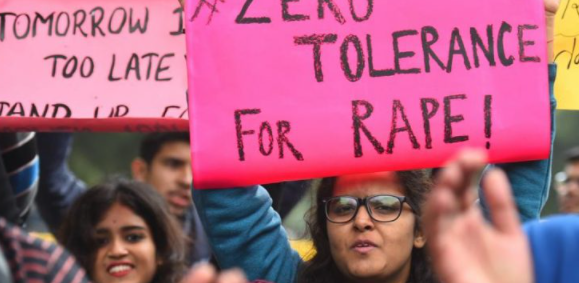Is Tying a Rakhi or Marrying the Sexual Assaulter Justice for the Victim?

Court directions to marry rapist or tie rakhis disregard what the survivor wants in order to protect her honour and upend law’s progressive morality, argues MEGHA KATHERIA .
———
Last week, the Madras High Court ordered an accused of statutory rape of a minor to marry the survivor as a condition of his bail.
In August this year, a judge of Madhya Pradesh High Court ordered an accused of sexual assault to get the victim to tie him a rakhi as a condition of his bail order. The order sent shockwaves and was sharply criticised by women rights advocates.
Yet, surprisingly this is not the first instance where courts have ordered establishment of a formalised relationship with the assaulter by tying a rakhi or marrying the victim.
Orders by courts asking the accused to marry girls they sexually abused or raped have often made headlines.
Criticising such misogyny in court judgments, noted women rights lawyer Vrinda Grover told The Leaflet that despite statutory amendments, regressive notions of ‘honour’ continue to obstruct women’s access to justice.
A bid to protect honour over autonomy of women
To be able to have control of her own matters is important for a woman’s autonomy. It boils down to the question of the woman’s agency over herself and thereby to make decisions for her body. Autonomy and agency over oneself are crucial to the realisation of her right to equality.
A patriarchal society turns a blind eye to the woman’s wishes and does not allow her to make decisions for herself. Instead, decisions are made for her by her male relatives who are seen as guardians of her being, and honour.
The Madras High Court judgment referred to earlier, notes that “the petitioner is ready and willing to marry the victim girl”. It also records that the survivor in her statement has admitted to being in love. Yet, there is no mention of whether she is willing to marry him. Moreover, can she make a decision about getting married as a minor?
The court has instead laid a bail condition that the parents must file joint affidavits with their ‘consent’ to this marriage. There is no direction of what is to happen if the girl’s parents decline to file such an affidavit. Will his bail stand cancelled if the parents refuse to get their pregnant daughter married? Or will his bail stand retrospectively cancelled if the girl refuses to marry when she turns 18?
In all likelihood, these thoughts are simply unfathomable to the court. The ball stops at the accused ‘willingness’ to marry the pregnant victim.
The court instead punishes the victim by forcing her to recognise her assaulter as her brother or husband. It denies her freedom over making decisions over her being. The survivor approaches the court to seek justice for the violation of her consent, but the court adds salt to her wounds and further violates her consent.
Devastating Effect of Misogynistic Judgments
In 2015, Justice Devadass of Madras High Court had directed the rapist to marry the survivor of sexual assault and referred them for mediation. The survivor was a minor at the time of the crime and had given birth to a child. In an interview with CNN, she said, “I am not ready to talk or get married to him. Why are they asking me to talk to him after seven years?”
Amidst criticism, the order found some support in the legal fraternity using ‘restitutive justice’.
Speaking to Deccan Chronicle, Advocate A Sirajudeen had said, “In case of rape, punishing the offender is a social necessity. But, if there are chances of rapprochement between the victim and the accused, in proper cases, the court can explore it also. In some cases, this rapprochement may also erase the impact of rape on the victim.”
He added that the court has only advised the accused to enter into mediation and not directed the survivor to accept mediation.
However, any form of dialogue under ‘restitutive justice’ is voluntary. The psychological trauma of the crime necessitates consent of the survivor in such processes, one that was clearly absent.
Despite being “advise” and not a direction, the order had a devastating effect on the survivor.
In October, Justice A Selvam set aside the man’s conviction and the fine imposed on him. He referred the case back to the Cuddalore court for a fresh trial on an appeal filed by the man who claimed the girl was a “major” when they had a “consensual” relationship, a technicality that the High Court itself could have examined.
The woman’s brother told The Indian Express she was “helpless” after the second High Court order. “After the HC referred her case back to Cuddalore, the court summoned officials to verify the authenticity of her birth certificate. The proceedings went on for days. One day, she took her child to the court and said she will marry him and go with him. The last HC order had dashed her hopes. I was struggling without a job, and she felt she was being a burden, dependent on me. She knew he (the accused) was trying to marry her only to escape conviction. He succeeded,” her brother said.
Such decisions resolve society’s issue of violation of her honour. But the patriarchal society is less concerned about the violation of her consent.
Ironically, the accused is seen as the guardian of the woman’s honour.
The letter of law recognises a woman’s agency over herself by looking at the crime from the prism of consent. It is clear in its language that violation of consent forms the ground for sexual assault and harassment. It is also clear on the punishment that must be levied for the said violation.
Attorney General K.K. Venugopal, appearing in the Supreme Court in an appeal against the Madhya Pradesh High Court referred to earlier, advised judges to stick to the provisions of CrPC in ascertaining bail conditions.
The Supreme Court in State Of M.P vs Madanlal castigated this method of compromise or settlement in rape cases calling the adoption of a soft or liberal approach as ‘spectacular error’. It said, “Sometimes solace is given that the perpetrator of the crime has acceded to enter into wedlock with her which is nothing but putting pressure in an adroit manner.”
Why do judges deviate from the law?
Criticising the Madras High Court judgment of 2015, Senior Advocate R Vaigai had said, “This happens because the judges’ minds are clouded by concepts of morality and shame.”
The bedrock of judging is the application of the judicial mind whilst deciding cases. To administer justice fairly the judges must dissociate themselves from the stakes of the case. They must be dispassionate and impartial.
But what is the extent of dispassionate disengagement when the stakes of the case are related to social or personal law? After all, judges come from the same society whose morals the law seeks to challenge and change.
Professor of Law Judith Resnik says, “Law talks about disengagement but does not talk about the degree to which judges are engaged, dependent, and connected.”
Thus, advocates of gender rights have demanded clear guidelines for judges while writing gender-related judgments. Attorney General of India K K Venugopal too asked the Supreme Court to implement gender sensitisation programs for judges following the Madhya Pradesh High Court judgment.
The law holds the power to implement social change. The spirit of law as a tool of social change challenges archaic social norms. Social transformation is at the essence of the Indian constitution that envisages progressive morals i.e constitutional morality.
But this powerful potential of law can be undone when judges apply their personal morality and fail to uphold constitutional morality.
It is not the function of the courts to get into questions of shame and dishonour, or play the role of a matchmaker.
The judiciary must endeavour to not only follow the letter of the law but also implement its spirit on gender justice.
(Megha Katheria is a researcher and sub-editor at The Leaflet. Views are personal.)
The article was originally published in The Leaflet.
Get the latest reports & analysis with people's perspective on Protests, movements & deep analytical videos, discussions of the current affairs in your Telegram app. Subscribe to NewsClick's Telegram channel & get Real-Time updates on stories, as they get published on our website.
























